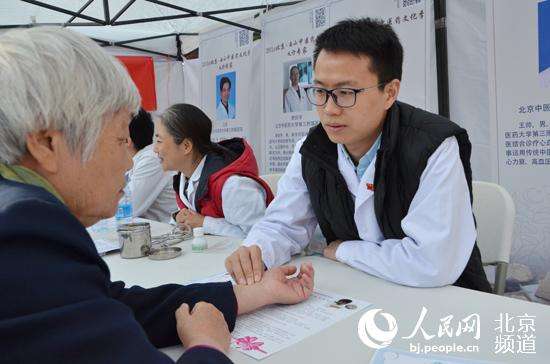

China's basic medical insurance system now covers more than 1.35 billion people and become increasingly sound. With people's need for medical services largely being met, the health level of the entire population has been significantly improved.

(Photo/People's Daily Online)
In only 20 years, China has built the largest basic medical insurance system in the world. More than 1.35 billion Chinese can now afford to see a doctor and purchase medicines. Patients with serious and chronic diseases have access to new and specialized drugs.
Poor patients receive subsidies so they can get covered by the insurance, and the number of people who become poor or return to poverty due to illness has been reduced to just over 1 million. China has created a miracle by giving full play to its institutional advantages.
China's basic medical insurance system covers more than 1.35 billion people, a coverage rate of about 97 percent, according to the National Healthcare Security Administration.
28,000 designated medical institutions across the country have realized direct settlement of cross-provincial medical treatment in different places, including more than 85 percent of tertiary designated hospitals, more than 50 percent of second-class designated hospitals and more than 10 percent of grass-roots designated hospitals.
A total of 4.2 million direct medical visits across provinces and from other places have been settled, and 60 billion yuan (about $8.7 billion) has been paid out by the medical insurance fund. Meanwhile, the number of people who became poor or returned to poverty due to illness has decreased from 28.5 million in 2014 to just over 1 million.
In recent years, medical insurance has made use of information and intelligent means to allow insured workers and residents to be covered by insurance, pay fees and settle accounts, for example, through mobile phone APPs and official WeChat accounts.
The continuous optimization of health insurance public management services, together with strengthened security capabilities, has improved people's experience, satisfaction, and sense of achievement of reform.
Today, China has built the largest medical security system in the world to benefit its people, who account for about 19 percent of the world's population. It has created a miracle of medical insurance reform and development in the history of human development, said Zheng Gongcheng, a professor at Renmin University of China and president of the Chinese Society of Social Security.
Furthermore, China piloted the centralized procurement of 25 kinds of drugs in 11 cities at the end of 2018. At the end of September 2019, the pilot project was expanded to the whole country, and the average price of drugs purchased in volume fell by more than 50 percent.
State organization has achieved remarkable results in centralized drug procurement and is going in the right direction, Wu Ming, Assistant Director of the Medical Department of Peking University, pointed out.
After structural optimization, drugs on medical insurance catalogues are more practical and more suitable for people's needs. It is estimated that after some negotiated drugs are included in reimbursement, the personal burden of patients will be reduced to less than 20 percent of the original cost, and the price of some individual drugs will be reduced to less than 5 percent of the original.
 Fire brigade in Shanghai holds group wedding
Fire brigade in Shanghai holds group wedding Tourists enjoy ice sculptures in Datan Town, north China
Tourists enjoy ice sculptures in Datan Town, north China Sunset scenery of Dayan Pagoda in Xi'an
Sunset scenery of Dayan Pagoda in Xi'an Tourists have fun at scenic spot in Nanlong Town, NW China
Tourists have fun at scenic spot in Nanlong Town, NW China Harbin attracts tourists by making best use of ice in winter
Harbin attracts tourists by making best use of ice in winter In pics: FIS Alpine Ski Women's World Cup Slalom
In pics: FIS Alpine Ski Women's World Cup Slalom Black-necked cranes rest at reservoir in Lhunzhub County, Lhasa
Black-necked cranes rest at reservoir in Lhunzhub County, Lhasa China's FAST telescope will be available to foreign scientists in April
China's FAST telescope will be available to foreign scientists in April "She power" plays indispensable role in poverty alleviation
"She power" plays indispensable role in poverty alleviation Top 10 world news events of People's Daily in 2020
Top 10 world news events of People's Daily in 2020 Top 10 China news events of People's Daily in 2020
Top 10 China news events of People's Daily in 2020 Top 10 media buzzwords of 2020
Top 10 media buzzwords of 2020 Year-ender:10 major tourism stories of 2020
Year-ender:10 major tourism stories of 2020 No interference in Venezuelan issues
No interference in Venezuelan issues
 Biz prepares for trade spat
Biz prepares for trade spat
 Broadcasting Continent
Broadcasting Continent Australia wins Chinese CEOs as US loses
Australia wins Chinese CEOs as US loses